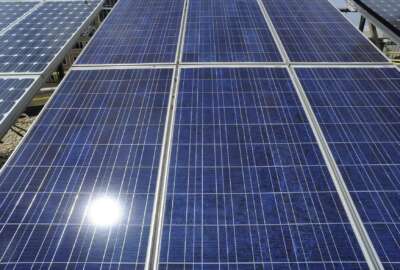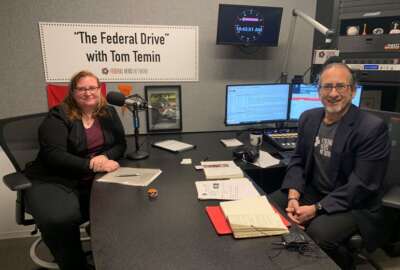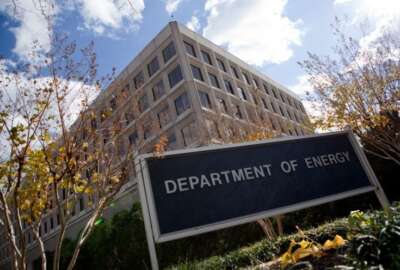

More than $22 million in cash prizes are available to teams with the best ideas accelerate widespread, equitable energy efficiency and building electrification...
More than $22 million in cash prizes are available to teams with the best ideas accelerate widespread, equitable energy efficiency and building electrification upgrades. The Energy Department’s Buildings Upgrade Prize, or Buildings UP, is asking teams to submit innovative concepts to increase building energy upgrades, with an nod toward equity or innovation. To learn more about the contest, the Federal Drive with Tom Temin spoke with the contest’s prize administrator Holly Carr.
Interview transcript:
Holly Carr The Buildings Upgrade Prize or Buildings Up was really designed to respond to the fact that about 35% of our country’s greenhouse gas emissions are coming from buildings, from existing buildings. So if we’re going to reduce our emissions in any significant way, we really need to address existing buildings and try to reduce those greenhouse gas emissions. And we have the technologies to do it. But for a variety of reasons, we are still only seeing about one to two percent of existing buildings being upgraded with energy upgrades every year. And we’ve got about 125 million of these buildings, and that’s simply not fast enough.
Eric White Obviously it’s easier to do these sort of upgrades when a new building is being constructed. What sorts of upgrades are there that can cut down on greenhouse gas emissions from buildings?
Holly Carr Yes. So for existing buildings, and this prize is completely focused on upgrading existing buildings. And some of the most important things that we can do in existing buildings are to upgrade heating and cooling systems. So both heating and air conditioning and also hot water. So that means transitioning over to heat pumps and heat pump water heaters. And the great thing about heat pumps is that, in addition to providing efficient heating capacity, they also serve as air conditioning or can serve that purpose. So sometimes buildings get air conditioning kind of as a bonus with upgrading to a heat pump.
Eric White Got you. And so this contest isn’t necessarily about finding new ideas necessarily. It’s just enacting some conservation techniques that may already be there and maybe also adding on some new techniques or what’s the idea?
Holly Carr That’s exactly right. This prize is really not a technology focused prize at its heart. It’s really meant to address these non technical barriers to getting these upgrades done in buildings across the country at scale. So we’ve got the technologies, we’ve got the heat pumps, we’ve got the heat pump water heaters, we know how to insulate buildings, we know how to do air sealing to make sure that they’re comfortable. But still, we are not getting the level of energy upgrades that we need in buildings to meet our greenhouse gas reduction goals. So this is really about addressing the financial, the social, the educational barriers and other kinds of barriers to getting these upgrades done at scale.
Eric White I see. So you’re just trying to add maybe a little bit more incentive there for companies to address their building concerns.
Holly Carr That’s right. And with the recent Inflation Reduction Act and the bipartisan infrastructure law, we’ve had these pieces of legislation come on board that have provided additional funding for these upgrades. So they’re more affordable than ever. But we still need to address these non technical challenges and even remaining financial challenges to making these upgrades really no brainers for the American public.
Eric White Got you. And so how will this contest work? Are you just going to go, I imagine you’re not going to go building to building. Is it going to be realty companies that are going to be able to submit? Or how’s this going to work?
Holly Carr So we are looking for 20 to 60 multistakeholder teams that will be winners in this phase one of the prize. We do anticipate the prize to consist of about four phases over about five years. So this very first phase is the concept phase, and we’re looking for 20 to 60 multistakeholder teams. We’re really open to what those teams look like. They might consist of your right building owners, local governments, tribal governments, state and municipal governments, nonprofit organizations for profits. We’re really open to what those teams look like, and we are especially hope that the teams will include community based organizations. And we have a really strong focus in this prize on making sure that these upgrades happen in what we’re calling equity eligible buildings. So, low and moderate income buildings and communities, disadvantaged business buildings. So we have a strong focus for the prize in those areas.
Holly Carr There are two pathways that teams can choose from to submit a concept plan. They can choose the equity centered innovation pathway, which is really focused on teams that are committing to complete the majority of their upgrades in equity eligible buildings in those low and moderate income homes, in those disadvantaged business buildings, etc. And teams that make that commitment to focus their upgrade initiatives there will receive $400,000 in prize funding, as well as access to a whole ecosystem of technical assistance to help them take their concept to an executable implementation plan in about 12 months. The second pathway that teams can choose from is the open innovation pathway. So teams following that pathway, they’re certainly welcome to address equity eligible buildings in their concept plan, but they’re not required to. So those teams choose a building type or a geographic area, or both, where they want to complete upgrades and they create a concept plan for how they’re going to really scale those upgrades and that building upgrades them.
Eric White So you weren’t kidding, this isn’t a technology focused contest like the Energy Department usually runs. This is public policy stuff, this is for political science majors like myself, potentially.
Holly Carr It is much more focused, as I said, on those non technical barriers. We’ve got the tech. We just need to get it in buildings now.
Eric White And where does this contest stand in the Department of Energy? You mentioned the equity in technology focused areas like this. And where does this stand in the Department of Energy’s overall mission and goals pertaining to the Biden administration’s directives?
Holly Carr I would say Buildings Up is just right smack in the middle of our mission, specifically in the Office of Energy Efficiency and Renewable Energy. Our mission includes accelerating the deployment of technologies and solutions that equitably transition America to net zero greenhouse gas emissions economy wide. And that is exactly what we’re trying to do here, particularly in the equity centered pathway, to make sure that folks are not left behind in this transition to clean energy and being able to use that clean electricity that is increasingly available on our grid thanks to solar and wind primarily.
Eric White And I got a little ahead of myself there. How will the groups that submit entries be judged in this contest? How will you determine who has the best plan?
Holly Carr Yeah, so folks can actually go right now to herox.com/buildingsup. And that’s really the nexus for this prize and where all the information is. The official rules document is located there, and the application will also be available for folks to submit their concept plans will be available on that website Feb.18. So teams can access that application. There are four or five narratives that teams will complete depending on which pathway they’re choosing to pursue. So teams respond to those four or five narratives. They’re fairly short narratives of about 500 words each, and that collection of narratives constitutes their concept plan. So we will have a group of reviewers, here at DOE and some partner organizations, that will review each of those applications, read through those narratives and score them on a very specific set of questions. And so combined with those scores and potentially interviews that we may do with some teams, will make decisions on those 20 to 60 winning teams that will be a part of the cohort that will move forward in the building’s upgrade prize.
Eric White And will you be among the reviewers? Or are you just dishing out the prize money?
Holly Carr For this first phase, I will be a part of their review team, yes. But I do want to mention that we are really looking for, in this prize, new voices and new faces who perhaps have not participated and DOE funding opportunities in the past. The reason we chose a prize structure in large part is that it is simpler for participants to participate in, there’s not as much paperwork involved. It’s a little more straightforward than some of our other funding vehicles. And we really do want to see new faces and new organizations submitting applications to participate in this prize. So if applying for DOE funding seems a little daunting, we actually have an application support bonus prize available that is open right now. This is a prize of $5,000 and 10 hours of technical assistance for new and under resourced teams that would like to try to submit a Phase one application. So we’ll provide some cash and some technical assistance to help folks think about their Phase one application and get that put together and submit it.
Copyright © 2025 Federal News Network. All rights reserved. This website is not intended for users located within the European Economic Area.
Tom Temin is host of the Federal Drive and has been providing insight on federal technology and management issues for more than 30 years.
Follow @tteminWFED



